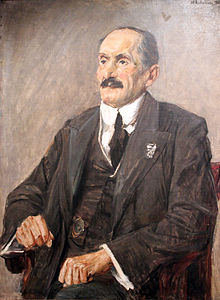Oskar Cassel

Oskar Cassel (born June 4, 1849 in Schwetz , † August 8, 1923 in Berlin ) was a German left-liberal politician. He was one of the leading figures in the Berlin city council during the German Empire . He was also a member of the Prussian House of Representatives and later of the Prussian state constituent assembly . He was also a representative of Jewish concerns and since 1917 chairman of the Association of German Jews.
Life
Cassel attended the Gymnasium zum Grauen Kloster and then studied law and political science in Berlin . He became a lawyer in 1879 and was also a notary from 1892. Cassel became a member of the Berlin Craftsmen's Association and worked for them as a teacher. In 1888 he became a member of the Berlin city council. He was elected to the Prussian House of Representatives in 1903. He belonged to the Liberal People's Party and later to the Progressive People's Party .
In the city council he was chairman of the parliamentary group of the old left. Cassel was elected deputy chairman of the city council in 1908. One focus of his work was the expansion of the transport infrastructure. He also advocated the municipalities' right to self-government against state influence. His influence on the politics of the capital was so great that Wilhelm von Kardorff and others called him the “uncrowned King of Berlin”.
Cassel was on the one hand an opponent of the nobility, on the other hand he was hostile to social democracy . Over time, he had to defend his mandate against the growing number of votes in the SPD. This led to a sometimes contradicting attitude. While Cassel advocated the abolition of three-class suffrage for Prussia , he opposed this for Berlin.
Last but not least, Cassel campaigned for the equal rights of Jewish judges and teachers in the civil service. In parliament he was one of the main representatives of Jewish interests. He was a founding member of the Aid Association of German Jews . Cassel rejected expulsions of foreign workers and traders for religious and political reasons. In parliament he campaigned for poorer Jewish communities to receive grants. While the moderate bourgeois parties agreed, Adolph Hoffmann , then SPD, rejected it. Later, too, the two often clashed in parliament.
For many years he was a committee member of the Association of German Jews and became chairman of the organization in 1917.
After the November Revolution, Cassel became parliamentary group leader of the DDP in the Berlin city council. Between 1919 and 1921 he was a member of the Prussian state constitutional assembly for this party. A short time later he was handcuffed to an armchair due to a serious illness.
He was made an honorary citizen of Berlin in 1914. He was the first Jew to receive this award in Berlin. After his death, Cassel was given an honorary grave by the city of Berlin in the cemetery of the Jewish community in Weissensee.
Individual evidence
- ↑ Bernhard Mann (arrangement) with the assistance of Martin Doerry , Cornelia Rauh , Thomas Kühne: Biographisches Handbuch für das Prussische Abrafenhaus 1867–1918 (= handbooks on the history of parliamentarism and political parties. Volume 3). Droste, Düsseldorf 1988, ISBN 3-7700-5146-7 , p. 94.
literature
- Ernest Hamburger : Jews in public life in Germany: members of the government, civil servants and parliamentarians in the monarchist era. 1848 - 1918. Tübingen, 1968. S. 368f. Digitized
Web links
| personal data | |
|---|---|
| SURNAME | Cassel, Oskar |
| BRIEF DESCRIPTION | German politician |
| DATE OF BIRTH | June 4, 1849 |
| PLACE OF BIRTH | Schwetz |
| DATE OF DEATH | August 8, 1923 |
| Place of death | Berlin |

